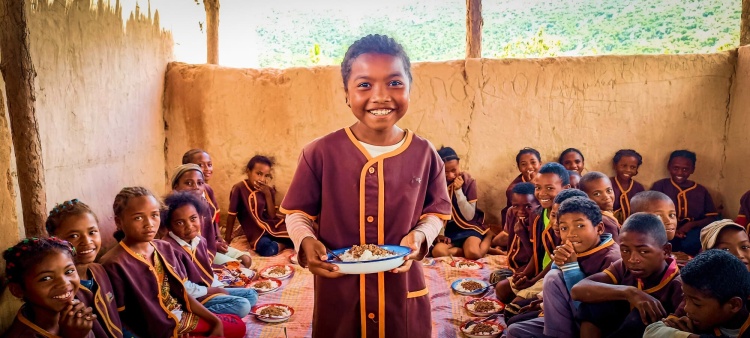Mary’s Meals serves meals to more than 83,000 children every school day in Madagascar
Life in Madagascar
Madagascar is currently ranked 173 out of 191 countries and territories in the Human Development Index (HDI). Despite the countries unique ecosystem providing a wealth of resources, Madagascar is one of the poorest and most aid-dependent countries in the world.
Madagascar is located in the Indian Ocean, off the coast of southern Africa. Farming, fishing and forestry are the key drivers of the country's economy. The country's agriculture is primarily made up of small-scale subsistence farmers and its main exports include coffee, tea and spices.
Madagascar is the fourth largest island in the world, with around 26 million inhabitants. It has the fourth highest rate of chronic malnutrition in the world, affecting almost half of all children under the age of five. Natural disasters are a severe threat to Madagascar and its people. In early 2022, the island was hit by numerous cyclones that caused widespread damage to infrastructure and livelihoods, and a loss of life, heightening economic pressures and food insecurity for families across the country.
Education levels among children are extremely low. More than 80,000 children of primary school-age are estimated to be out of school, and more than a third do not complete primary school.

Mary's Meals in Madagascar
Mary’s Meals has been serving school meals in Madagascar since 2018.
Our school feeding program is delivered by our partners, Feedback Madagascar and Money for Madagascar (MfM). Feedback Madagascar provides nutritious daily meals to more than 80,000 children in over 450 primary schools across four regions. MfM make it possible for us to reach a further 3,500 children in 30 places of education (a mix of primary schools in the Itasy region and children’s centres in Antananarivo).
We also operate a special feeding program together with our long-standing partner, Grandir Dignement. Together, we bring hope to more than 300 vulnerable children in six places of education within five detention centres and one reintegration centre.
Children in detention centres face terrible conditions – some of them are as young as eight years old and many are still awaiting trial. Educators from Grandir Dignement work with the children, teaching literacy, numeracy and vocational skills. There is no consistent provision of food in the centres, so our special feeding program is a lifeline for those being detained.